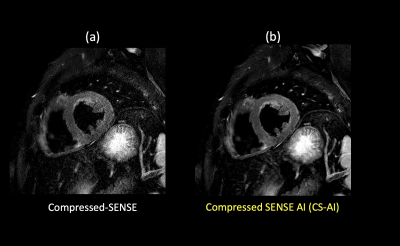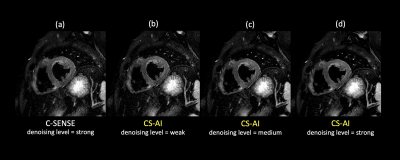2667
Myocardial T2-weighted black-blood imaging with a deep learning constrained Compressed SENSE reconstruction1Radiology, Tokyo Metropolitan Police Hospital, nakanoku, Japan, 2Philips Japan, Tokyo, Japan, shinagwaku, Japan, 3Philips Healthcare, Best, Netherlands, Netherlands, Netherlands
Synopsis
In high-resolution dual inversion recovery myocardial T2-weighted black-blood (T2W-BB) imaging, using very high acceleration factors with very high resolution can result in degradation of image quality due to insufficient noise removal. In this study, we applied the Compressed-SENSE Artificial Intelligence (CS-AI) framework to further increase the spatial resolution and reduce the scan time. The purpose of this study was to acquire high-resolution myocardial T2W-BB with reduced scan time and compare the image quality between images reconstructed with CS-AI and conventional C-SENSE.
Introduction
Combined sensitivity encoding (SENSE) and compressed sensing (Compressed SENSE: C-SENSE) achieves scan time reduction beyond that possible with conventional parallel imaging acceleration. We implemented C-SENSE to reduce scan time for high-resolution dual inversion recovery myocardial T2-weighted black-blood (T2W-BB) imaging. However, using very high acceleration factors with very high resolution can result in degradation of image quality due to insufficient noise removal. Recently, integrating artificial intelligence (AI) into MRI reconstruction has attracted much attention to further accelerate scans. At 2019 fastMRI challenge, a novel deep neural network was introduced as Adaptive-CS-Net and showed superior performance for reconstructing the knee image from highly undersampled k-space data1–4. The Adaptive-CS-Net was expanded to multiple contrasts and anatomical areas and presented here as a Compressed SENSE AI (CS-AI) reconstruction.Purpose
The purpose of this study was to acquire high resolution myocardial T2W-BB with reduced scan time and compare the image quality between images reconstructed with CS-AI and conventional C-SENSE.Methods
The study was approved by the local IRB, and written informed consent was obtained from all subjects. A total of five volunteers were examined on a 3.0T system (Ingenia Elition X, Philips Healthcare) with dS Torso coil. High resolution myocardial T2W-BB MRI was reconstructed by C-SENSE and CS-AI. The image quality of C-SENSE and CS-AI was first visually compared with the reconstruction parameter denoising level set to strong for both cases. Next, myocardial T2W-BB MRI was reconstructed by CS-AI with three denoising levels: weak, moderate, and strong. The influence of the denoising level on image quality was qualitatively assessed. following parameters were common to all examinations: FOV = 320×260, acquisition = cartesian, scan mode = M2D, profile order = linear, TSE factor 27, slice thickness (mm)/gap = 8.0/0.8, REC voxel MPS (mm) = 0.44×0.44, ACQ matrix M×P = 400×318, TR(ms) = 2 beats, flip angle = 90, TE (ms) = 88, Echo space = 6.0, C-SENSE acceleration factor = 3.2, NSA = 1, scan time = 8-12min (depends on heart beats).In the CS-AI reconstruction, the C-SENSE reconstruction chain is merely replaced by a convolution neural network (CNN) reconstruction. To be concise, the iterative part of SENSE and wavelet constraining is replaced by a chain of U-Net blocks that perform the transformation from raw into image data.Results and Discussion
Representative high resolution T2W-BB images using the C-SENSE and CS-AI reconstructions are shown in Figure 1. Reconstruction parameter denoising level was set to strong for all cases. At the acceleration factor examined, the CS-AI clearly reduced the noise better compared to C-SENSE, and the depiction of the myocardium improved.Figure 2 shows the high resolution T2W-BB images reconstructed by C-SENSE with denoising level = strong and CS-AI with denoising level = weak, medium, and strong. As the denoising level increased, a reduction of the noise level around the myocardium was observed in CS-AI. Among the three denoising levels used for the CS-AI, the denoising level = weak looked the closest to the C-SENSE with denoising level = strong.Conclusion
The results of our preliminary study suggest that the application of CS-AI may be able to improve the image quality of myocardial T2W-BB.Acknowledgements
No acknowledgement found.References
1. Knoll F, Zbontar J, Sriram A, et al. fastMRI: A Publicly Available Raw k-Space and DICOM Dataset of Knee Images for Accelerated MR Image Reconstruction Using Machine Learning. Radiol Artif Intell. 2020;2(1):e190007.
2. Knoll F, Murrell T, Sriram A, et al. Advancing machine learning for MR image reconstruction with an open competition: Overview of the 2019 fastMRI challenge. Magn Reson Med. 2020;(January):mrm.28338. 3. Pezzotti N, Yousefi S, Elmahdy MS, et al. An Adaptive Intelligence Algorithm for Undersampled Knee MRI Reconstruction. IEEE Access. 2020;8:204825-204838.
4. Pezzotti N, de Weerdt E, Yousefi S, et al. Adaptive-CS-Net: FastMRI with Adaptive Intelligence. arxiv. 2019;(NeurIPS).
Figures

(a) C-SENSE T2W-BB (b) CS-AI-T2W-BB
Figure 1. Representative high resolution T2W-BB images using the C-SENSE and CS-AI reconstructions.

(a) C-SENSE strong (b) CS-AI weak (c) CS-AI medium (d) CS-AI strong
Figure 2. High resolution T2W-BB images reconstructed by C-SENSE with denoising level = strong (a) and CS-AI with denoising level = weak, medium, and strong for (b), (c), and (d), respectively.